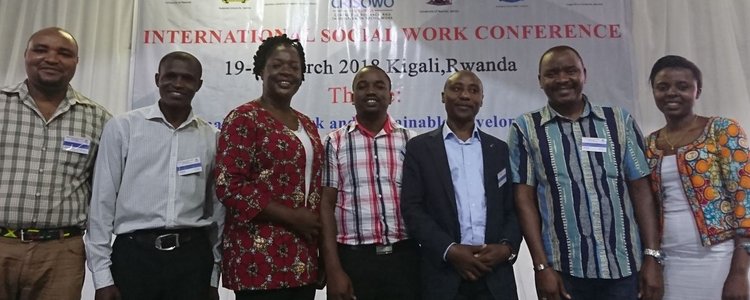500 researchers, educators, practitioners, policy-makers and students came together in order to discuss key challenges of African societies in the 21st century, to deliberate on the role of social work, and to establish national, regional and international networks. The delegates came from 25 countries in Africa, America, Asia, Australia, Europe and the Middle East. Among them were several current and former APPEAR scholarship holders who presented their research findings with regard to the overall conference theme “Social Work and Sustainable Development in Africa”. Read more in the book of abstracts.
Leah Mwaisango Kalemela was a Lecturer at the Institute of Social Work Tanzania (ISW). Leah also worked with the Tanzania Gender and Network Program (TGNP) as facilitator in different socio-political matters related to gender issues and as HIV and AIDS counsellor. Besides she trained and advised adolescents on their sexual and reproductive health. In 2016 she started her PhD in Development Studies at the University of Vienna. In the conference Leah presented her PhD research on “Everyday Lives Experiences of Children Living in Child Headed Households in Tanzania: a case of Sukumaland”. Child Headed Households (CHH) have been associated with the emergence of HIV and AIDS in 1984 which resulted in the death of many parents. Orphans had to take care of themselves and their siblings. Studies in Tanzania concentrated on AIDS related orphans and their needs and challenges which children encounter in their daily lives. Leah’s research goes beyond these studies. She focuses on other factors which result in CHH and she examines how these children have been able to meet their needs, the skills which they employ in their day to day lives and rationale towards their doing.
Jacqueline Murekasenge was a Lecturer and Head of Social Work and Community Development Department at Hope Africa University Bujumbura Burundi and the Burundi Country Coordinator of PROSOWO II before starting her PhD studies in International Development at University of Vienna in 2016. Jacqueline Murekasenge talked about “Free Primary Education Policy in Burundi: Aspiration at Local Community Levels and Policy Implementation”. The Policy has been implemented since in 2004, under the framework of the MDGs and Educational For All. Some factors related to poverty and lack of school material are frequently reported to be challenging the effectiveness of the policy. But this research is assessing the aspirations of people concerned by education at local community level and its relevance, as it focuses on local community’s context, realities and experiences. The research is being conducted in rural areas.
Charles Rutikanga worked as social work practitioner for 3 years before he joined academia. He was an Assistant Lecturer at University of Rwanda, Department of Social Sciences and Social Work and the PROSOWO II Rwanda country coordinator, a role he also had in PROSOWO I. He has been involved in the implementation of different research projects in the area of poverty reduction, social work practice and education, child and family. In 2016 he started his PhD at the University of Vienna. In the Kigali Soical Work Conference he gave several presentations; one on his PhD research on “Ubudehe traditional approach: A social work analysis of homegrown solutions and poverty reduction in Rwanda”. The study focuses on indigenous and innovative models of social work practice. Initial findings establish that development programmes in place are informed by cultural practices and are more or less similar to social work models of helping individuals, families, groups and communities and one of these models is ubudehe which played a significant role towards poverty reduction in post-genocide Rwanda.
Two former scholars who already completed their PhD studies in Austria within the first project phase of PROSOWO presented as well their current research. Elijah Macharia Ndung’u lectures Counseling Psychology, Social Work and Research Methods at St. Paul’s University, Nairobi in the Faculty of Social Sciences. He talked about “Mobile telephony in social work service delivery: A Kenyan perspective”. Ronald Luwangula is a Lecturer at Makerere University, Department of Social Work and Social Administration, Uganda and presented the study “Building resilience through indigenous mechanisms: The case of Bataka groups in South-Western Uganda”.
Apart from more than 150 presentations, the conference also allowed for social action: On World Social Work Day, participants marched on the streets of Kigali, thus advocating the relevance of social work in sustainable development, social justice and human rights, and making the power of the profession visible to the public. In addition, the delegates gathered at the Kigali Genocide Memorial in order to commemorate the 1994 genocide that caused close to one million casualties, and laid down a wreath on behalf of the international social work community.
